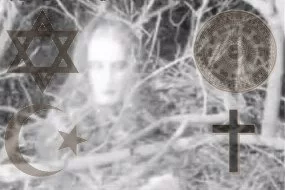
Do you have religious beliefs? Have you examined how those beliefs impact your perception of ghosts and haunting? If you wish to be a great ghost researcher, then we recommend eventually examining different religions and their teachings about ghosts. We also urge you to attempt to lay down preconceived religious ideas, researching with an open mind.
Ghosts are found within many religions, though many people from western cultures are not aware of it. Most religions teach that a spiritual aspect of human beings, whether the religion calls it a soul, spirit or ghost, survives beyond the destruction of the physical body. Ghosts may best be described as people who upon death, remain earthbound, and interact with mankind, being trapped within the earth realm due to emotional trauma of some sort. Many religions believe that addictions, lusts, tragedies and unfinished business seem to be the predominant causes of many a ghosts' sufferings.
Let's look at some of the common core teachings that most of the major religions agree with each other on.
Ghosts Suffer
Hinduism, Buddhism and Judaism all teach that ghosts exist and many ghosts suffer for various reasons. They teach that attachments to places, people, possessions or pleasures can cause ghosts to remain attached to the Earth realm.
Ghosts Possess or "Attach"
All three religions mentioned above teach that ghosts can possess, or attach to, the bodies of the living in order to influence the host . Of note, these religions do not teach that demons possess human beings. The idea of ghosts influencing the living, in one way or another, is very real.
Judaism, Christianity and Islam
In Jewish folklore, an evil spirit of a deceased human can posses a living human, and turn him into a dybbuk. The Torah and Talmud do not use the term, but describe stories in which such possessions occur. Christian denominations hold varying views on ghosts. Catholic Church teachings indicate that souls from deceased bodies may end up in a state between heaven or hell called limbo or purgatory, but Catholic teachings differ on whether such souls can come into the living world. Protestant churches reject the idea of an intermediate place, and believe that the spirits of the dead go immediately to heaven or hell. They explain ghosts in the Bible as a phenomenon that took place only in biblical times. Islam also teaches that when people die, they go to a heaven or a hell, and do not linger in the world, but that spirits called Jinn exist. Jinn are less powerful than angels, but can possess humans and punish them by causing harm or disease.. Shintoism believes in spirits that linger after the body dies. Kami can be described as spirits, but the term also incorporates forces of nature. Kami may come from the spirits of deceased humans and can be good or evil... The Garuda Purana, part of the Smriti, a sacred Hindu scripture, describes the origin of life forms, including humans, and the various stages that a person inhabits in ghostly form. - Timothy Peckinpaugh
Ghosts Should Be Treated With Compassion
The religions of Buddhism, Judaism and Hinduism all teach that ghosts are suffering people who may need our help to move on beyond their state of turmoil. Hinduism and Buddhism have religious rituals to honor deceased ancestors which are believed to help free their souls to move on in their life journey. Certain sects of Buddhism teach how to free ghosts from earthly bondage by directing them toward the golden light. Judaism's practioners of ritualist Kabbalah teach a process of ghost exorcism that brings healing to both the ghost and the host. All three religions agree that ghosts are hurting people, earthbound and in need of the living's assistance.
Some teachings of Christianity, such as Catholicism, allows for a time of purgatory, that metaphorically lines up with the idea that earthbound ghosts are people who temporarily suffer for a time on Earth until they are spiritually cleansed and able to move beyond the natural realm. In contrast, fundamental christianity does not allow beliefs in ghosts, as doctrines teach that the existence of ghosts are impossible due to short-minded beliefs that a person must be either in heaven or hell. Perhaps, teachers of such beliefs should consider that the idea of suffering and hell is really about the frame of mind (fearfulness, condemnation, guilt, etc.) that ghosts find themselves in, and does not need to be an eternal place of torment - an idea that was created hundreds of years after Jesus by religious leaders.
Why would Jesus say, "The gates of hell shall not prevail," if it were not true? If one looks at the teachings credited to Jesus, and is open to understanding them as metaphors (they were parables), then it becomes abundantly clear that the teachings of the Jewish Rabbi, who we call Jesus, lines up perfectly with some of the ritualistic teachings of (Jewish) Kabbalah and also with some of the teachings of Buddhism and Hinduism!
From that perspective, we are able to see that perhaps the major religions mentioned above have more in common than many believe. A fact that may help bring the whole of humanity together, spiritually speaking, through understanding what happens to people after their bodies die, ghost behavior and haunting. If we are able to identify with the lost and hurting in the unseen realm, who likely coexist with all of us, then maybe, we can be of help not only to them but to ourselves and each other.
http://www.angelsghosts.com/ghosts_religion
http://people.opposingviews.com/religious-beliefs-ghosts-6141.html

